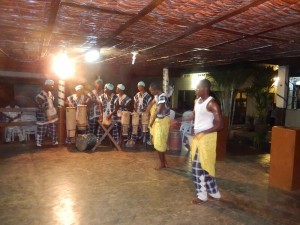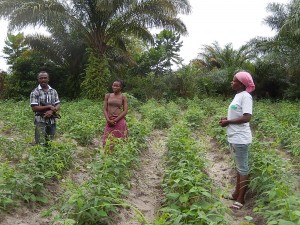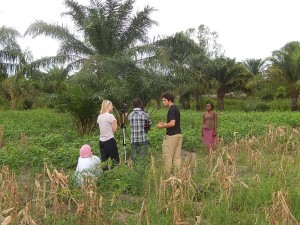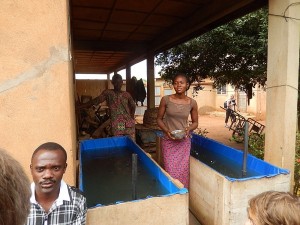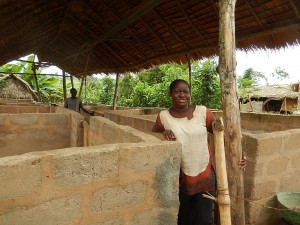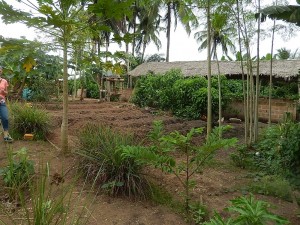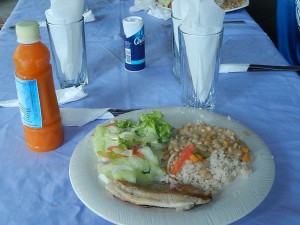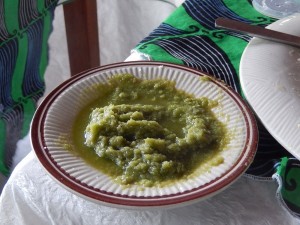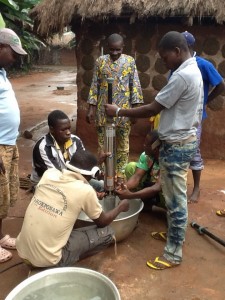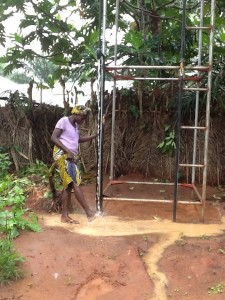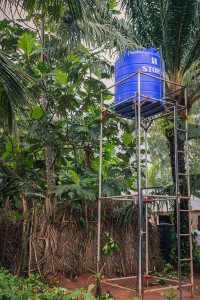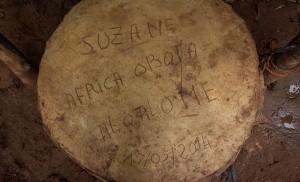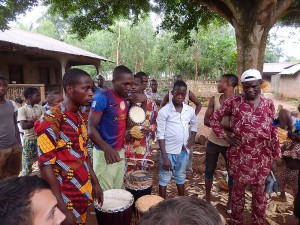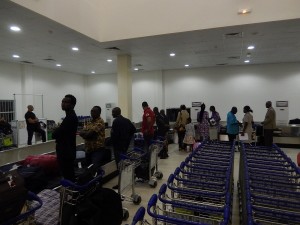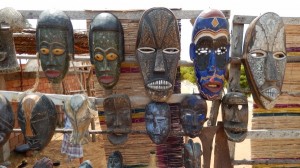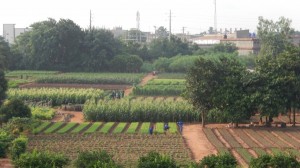One of the great surprises of this year’s trip was the arrival at one of Songhai’s pavillions of a local drum and dance group. They put on a great show for the group which brought them and we were welcomed to look on.
All posts by Alfino
The Soton Sisters’ Farm
Judith Soton and her sister, Aude de Grâce, graduated from Songhai in 2013 and used family money and a loan from Songhai to start their farm near Porto Novo. Their story shows both the promise and challenges of putting their Songhai training to work.
They began with chickens for egg production and rabbits. After constructing animal enclosures and raising the animals, they are just now at the point where they can expect some revenue from these efforts. They also raise catfish in two small tarp-lined tanks on the front porch of their house. At this point they buy feed or make feed by hand because they do not yet own the equipment to mix and make feel pellets more efficiently.
Their father bought 1 hectare of land near to their home where they have begun crop cultivation. With revenue from eggs, rabbit, and fish production they can hire farm laborers and increase crop production. The promise of intensive farming is that revenue from one part of the enterprise can help to develop other forms of production. All of this takes time, which is one of the big challenges of putting their Songhai training to work.
Below: The Soton sisters, with our camera team, who interviewed them at their farm.
Return To Elive’s Farm
Two years ago we visited the farm of two Songhai graduates, Elvie and Abeguedo. Elvie had received a $2500 grant from the US non-profit Eliminate Poverty Now and she and her husband had used the start up money to raise chickens, rabbits, and to plant the first 1/2 hectare of land of their new farm. You can read the first report on their farm from the Eliminate Poverty blog at:
<a href=”http://www.scribd.com/mobile/doc/126926695″ title=”First report on Elive’s farm” target=”_blank”></a>
On this visit we had a chance to see the extraordinary progress they have made with their enterprise. Their cultivated crops and fish ponds are far more extensive, they have added pigs and ducks to their animal agriculture. They have one full time worker now and are starting to build a house on the property. Their story shows the power of the intensive sustainable farming techniques of the Songhai Training Program, especially when practices by entreprenurial and hard working graduates with a little support from friends in the U.S.!
Below: Some images from the expanded farm. Elvie near new pig pens and a view of the first tier of planted crops. From here we walked past several fish ponds to a field planted in sugar cane.
Pepe Pima and The Good Food of Songhai
Plenty of french bread, omlettes, beans, rice, chicken, in the Songhai diet. And with almost every meal outstanding pineapple and fresh juices. A new discovery this year is “pepe pima,” a very spicy pepper mixture that is now accompanies many of our meals.
Below: A typical “light” lunch at Songhai and some “pepe pima”
Water at Zoungbomey village!
The seven year relationship between Zoungbomey Village (outside Porto Novo) and the Gonzaga-in-Benin Program (and the associated Water Foundation) continues this year. The village has increased its collectively run palm oil business after receiving a new well, pump, and water tower from the Water Foundation. Palm oil profits provided coverage for medical emergencies and have enabled the completion of a village school, allowing all children to attend school for the first time. The village continues to reinvest palm oil revenues to expand production and now wants to expand animal agriculture to include egg and pork production.
Special thanks to our colleague and collaborator Landry Lougbegnon at Centre Afrika Obota and Dr. Susan Norwood with the Water Foundation for helping the village of Zoungbomey to make this project a success.
Below: Testing the pump, fresh water from the tower, tower, and well cover. Thanks to Katrina Van Tassell for tower and well pictures.
Adjarra and the Talking Drum
One of our stops is the nearby village of Adjarra, where two families make many of the drums for markets in Southern Benin. This year the family we have been visiting for many years made a presentation for us about drum making. This included a demonstration of the “talking drum,” as seen in the video linked below. A talking drum is a two-sided drum with strings that modulate the drum sound. Traditionally, talking drums were used to communicate messages from a village and even relayed “point to point.”
Returning to the point of no return….
Yesterday we passed through Cotonou and followed a bumpy stretch of road to Ouidah and the “Point of No Return,” a UNESCO site commemorating the African slave trade. This year we added some new detail from an excellent guide who made the tragic business of the 17th-19th century Atlantic slave trade more vivid by showing us some stops on the route from the French, Dutch, English, and Portugese trading posts to the beach, including sites in which slaves were temporarily held in horrible conditions, a mass grave for slaves who died before boarding, and rituals associated with the return of the spirit from foreign lands.
The beach by the “Point of No Return” monument is also the site of an annual gathering for the high priest of Vodunn, which occurs in January each year. This hut is a related site on the beach for followers of “Mama Wata,” the Vodunn goddess of water.
Most of the group at the beach.
New baggage area at Cotonou airport!
Pre-departure Day
The Gonzaga-in-Benin 2014 Program meets at Charles de Gaulle airport north of Paris tomorrow for our flight to Cotonou. So much preparation and reading have gone into this year’s program, and I’m grateful for a great group of students organized into three classes (Ethics, Philosophy of Culture, and Broadcast Journalism) and one big “Learning Community”. We’ve read about the history, politics, and culture of Benin, we’ve planned research and service projects, and we’ve traded advice about travel. Now it’s time to start the adventure!
Mark
